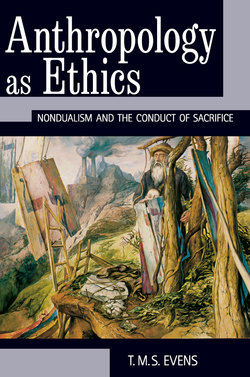Anthropology as Ethics

Реклама. ООО «ЛитРес», ИНН: 7719571260.
Оглавление
T. M. S. (Terry) Evens. Anthropology as Ethics
Отрывок из книги
ANTHROPOLOGY AS ETHICS
Nondualism and the Conduct of Sacrifice
.....
In order to demonstrate that ideas or truths of reason are always tied to being-in-the-world, Merleau-Ponty takes up Descartes’ example (in his Fifth Meditation, but harking back to Plato and forward to Kant) of the triangle as a pure idea, that is, as an idea in itself, cleanly detached from the empirical world. Merleau-Ponty's discussion is involved (1962: 383ff.; cf. Hall 1979), but the following highly anthropological observation by him—evocative of Wittgenstein's that “norms of description” can grow from hard to soft propositions—suffices here to indicate the spirit of his point (Merleau-Ponty 1962: 394): “[T]he alleged transparency of Euclidean geometry is one day revealed as operative for a certain period in the history of the human mind, and signifies simply that, for a time, men were able to take a homogeneous three-dimensional space as the ‘ground’ of their thoughts, and to assume unquestioningly what generalized science will come to consider as a contingent account of space.”
What, then, of the other side of the two-way relationship he called “founding”? If, as against intellectualism, the truths of reason are always derivative, then must we, as dualism bids us, plump for empiricism? But the whole of Merleau-Ponty's great book is geared to show that neither empiricism nor intellectualism can do the ontological trick. For the founding facts in which Merleau-Ponty's “founding” begins are, like Wittgenstein's hard propositions, far from ordinary empirical facts. Instead, they are matters of basic ambiguity. Such ambiguity, which cannot be “resolved” but can be “understood as ultimate” (Merleau-Ponty 1962: 394), recalls Wittgenstein's thesis of truths that can be shown but, precisely because they are imprisoned in practice and do not stop for logical logic, cannot be said.
.....